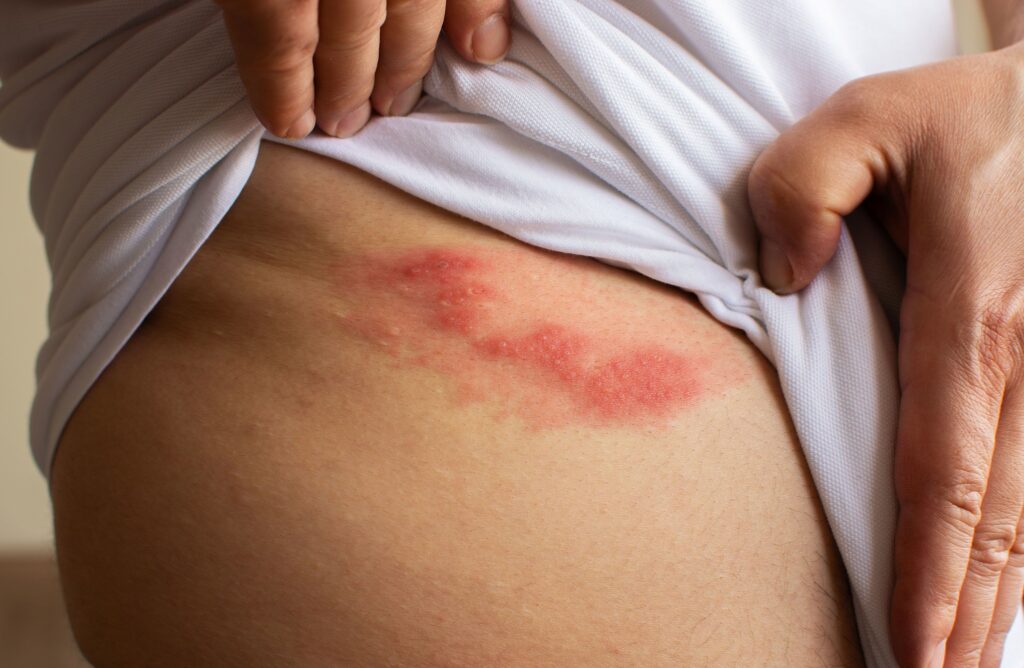Makeup
Shingles: How to Manage the Pain
Shingles is a viral illness induced by the varicella-zoster virus, the very pathogen responsible for chickenpox. This condition manifests primarily through a painful rash, which often emerges on one side of the body in a distinct stripe-like formation, frequently seen on the torso, neck, or face. Initially, the rash presents itself as a cluster of small, raised bumps, which subsequently transform into fluid-filled blisters. Over the course of about 7 to 10 days, these blisters dry out and develop crusts. The occurrence of shingles is more prevalent among older individuals and those with compromised immune systems. Various factors, including stress, cancer treatments, and specific medical conditions, can act as triggers for this infection.
Recognizing Shingles Symptoms
The primary symptoms associated with shingles encompass a range of discomforts and manifestations, including:
Pain: The earliest indication of shingles is typically a tingling or painful sensation in a localized area of the skin. This initial discomfort can be accompanied by a headache or an overall feeling of malaise, where the individual may feel generally unwell.
Rash: Following the initial pain by a few days, a rash emerges. This rash is marked by a cluster of small, raised bumps that eventually evolve into fluid-filled blisters. These blisters tend to dry out and form crusts within a span of 7 to 10 days.
Itching: As the blisters undergo the healing process, they can become intensely itchy, adding another layer of discomfort.
Fever: In some cases, individuals might experience additional systemic symptoms such as fever, chills, headaches, fatigue, light sensitivity, or an upset stomach, contributing to a feeling of general illness.
Nerve pain: One of the more persistent and troubling aspects of shingles is nerve pain, referred to as postherpetic neuralgia (PHN). This nerve pain can linger for months or even years after the rash itself has resolved.
The rash typically manifests on one side of the body, often appearing in a band or strip. It can affect various parts of the body, including the chest, back, face, eyes, and buttocks, further illustrating the widespread impact of this viral infection.
Read also: Cold Sore: Effective Treatments and Prevention Tips
Top Treatments for Shingles Pain
Effective treatments for alleviating the pain associated with shingles include a combination of antiviral medications, pain relievers, topical treatments, and natural remedies.
Antiviral medications
Drugs such as acyclovir (Sitavig, Zovirax), famciclovir (Famvir), and valacyclovir (Valtrex) are particularly beneficial if administered within the initial 72 hours of the rash’s appearance. These medications can significantly reduce the severity and duration of shingles symptoms by combating the underlying virus.
Pain relievers
Over-the-counter analgesics like acetaminophen, ibuprofen, and naproxen are effective in reducing inflammation and managing the pain linked to shingles. These medications can provide much-needed relief from the discomfort caused by the infection.
Numbing creams and lotions
Topical applications containing lidocaine (Lidoderm, Xylocaine) or capsaicin can be applied to the rash to numb the pain and decrease discomfort. These creams and lotions are particularly useful for targeted pain relief on the affected skin areas.
Cool compresses
Applying cool, moist compresses to the inflamed skin can offer soothing relief. This simple remedy can help reduce pain and calm the irritated skin, providing a measure of comfort to those suffering from shingles.
Oatmeal baths
Immersing oneself in a lukewarm bath with colloidal oatmeal can alleviate itching and discomfort. This natural remedy is effective in soothing the skin and providing a break from the persistent itchiness associated with shingles.
Dietary changes
Consuming foods rich in vitamins A, B-12, C, and E, along with the amino acid lysine, can help boost the immune system and reduce inflammation. A nutritious diet can support the body’s healing process and potentially mitigate the severity of the symptoms.
Stress management
Techniques such as regular exercise, meditation, and ensuring adequate sleep can help reduce stress, which in turn supports the body’s healing mechanisms. Managing stress is crucial, as it can prevent complications like postherpetic neuralgia and aid in the overall recovery from shingles.
The essential strategy in managing shingles involves seeking prompt medical attention and employing a multifaceted approach that includes antiviral medications, pain relievers, and natural remedies to effectively control and alleviate the symptoms.
How to Differentiate Shingles from Other Skin Conditions
Distinguishing shingles from other skin conditions can be challenging, but here are some key characteristics to look for:
Shingles Identification: One of the most distinctive signs of shingles is a painful, blistering rash that typically appears in a stripe-like pattern confined to one side of the body. This rash usually manifests on the torso, neck, or face. It begins as small red spots that gradually develop into fluid-filled blisters, which then crust over within a period of 7 to 10 days. This pattern and progression are quite characteristic of shingles.
Associated Symptoms: In addition to the rash, shingles can present with other symptoms such as fever, chills, headache, and gastrointestinal issues. Often, the rash is preceded by sensations of pain, itching, or tingling in the affected area, providing an early indication of the condition.
Differentiating from Other Skin Conditions: Several other skin conditions can resemble shingles, including contact dermatitis, candida infections, impetigo, insect bites, and folliculitis. However, these conditions typically do not exhibit the distinct stripe-like rash pattern seen in shingles and may present with different symptoms and rash progressions.
Rash Development Timeline: The timeline of rash development is another critical factor in distinguishing shingles from other conditions. Shingles rashes tend to appear in a clear, stripe-like pattern over several days, whereas rashes from other conditions may develop and spread differently.
Seeking Medical Diagnosis: To obtain an accurate diagnosis, it is crucial to consult a doctor. A healthcare professional can examine the rash, review your medical history, and possibly order tests to confirm whether it is shingles. Prompt medical attention is essential, as early treatment with antiviral medications can significantly reduce the severity and duration of the symptoms associated with shingles.
Evaluating the Effectiveness of Traditional Chinese Medicine for Shingles
Traditional Chinese Medicine (TCM) treatments can serve as a beneficial complement to conventional medical therapies for shingles:
Holistic Approach: TCM approaches, such as acupuncture and herbal medicine, aim to address the underlying imbalances within the body that contribute to the manifestation of shingles. Research has indicated that incorporating acupuncture alongside antiviral therapy can effectively alleviate pain, reduce the duration of blisters, and accelerate the healing process.
Acupuncture Benefits: Acupuncture, in particular, has been shown to be highly effective in managing the neuropathic pain associated with shingles and its complication, postherpetic neuralgia (PHN). Electroacupuncture, when combined with antiepileptic medications, is reported to be the most effective method for alleviating PHN pain.
Herbal Remedies: TCM herbal remedies, including ingredients like houttuynia and forsythia, possess antiviral properties that can help diminish the severity and duration of shingles symptoms. Additionally, dietary therapies that emphasize immune-boosting foods can further support the body’s healing process.
Safety and Tolerance: Generally, TCM treatments are safe and well-tolerated, with minimal side effects, making them a viable complementary option to conventional antiviral medications.
Integrated Treatment Approach: It is crucial to note that TCM should not be used as a replacement for standard medical treatment. The optimal approach involves integrating TCM with antiviral drugs and other conventional therapies prescribed by a healthcare provider. Consulting with a qualified TCM practitioner can ensure safe and effective integrative treatment for managing shingles.



I need to to thank you for this good read!! I absolutely enjoyed every little bit of itI’ve got you book-marked to look at new things you post…
Thank you very much for your appreciation.
Hey people!!!!!
Good mood and good luck to everyone!!!!!
The best SEO company for your business, the optimal solution for online promotion.
Optimal choice of an SEO company for your business, strategies for successful selection.
Advantages of working with experienced SEO specialists, what results you can achieve.
Assessment of market leaders in SEO services, real reviews.
Effectiveness of an SEO company for your website, key benefits.
improve amazon seo [url=https://seorg-seo.com/]improve amazon seo[/url] .
Wedding Bells: professional approach to your wedding, we care about every detail.
photographer and videographer [url=http://bestwedding-video.com/]http://bestwedding-video.com/[/url] .
Meet someone who understands you. – http://xurl.es/p0gwt
Erectile dysfunction treatments available online from TruePills.
Discreet, next day delivery and lowest price guarantee.
Trial ED Pack consists of the following ED drugs:
Viagra Active Ingredient: Sildenafil 100mg 5 pills
Cialis 20mg 5 pills
Levitra 20mg 5 pills
Acquistare viagra con paypal:
https://cutt.ly/revrx6EP
https://cutt.ly/gevrvQ2P
https://u.to/BdO4IA
Hey people!!!!!
Good mood and good luck to everyone!!!!!
Car rental is the best choice for traveling, unlimited possibilities.